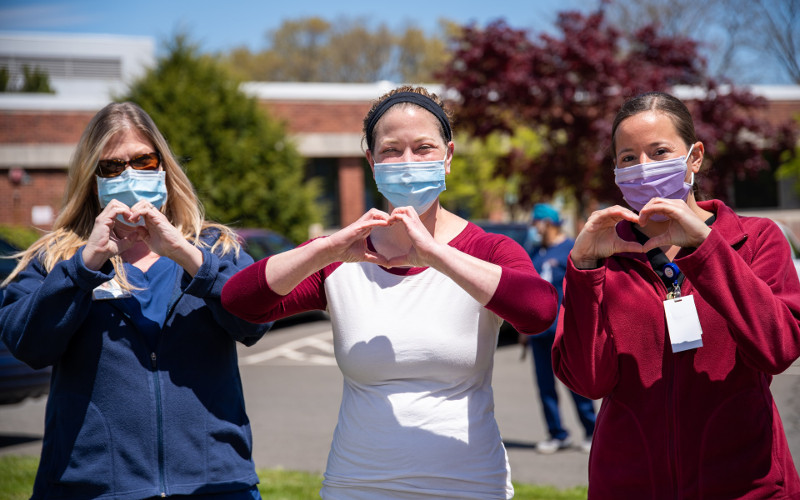Is a “Philanthropy Academy” Your Next Grateful Patient Program Investment?
Jenny Love
Published: 10/07/2020

The power of gratitude is undeniable. A gratitude-based culture enhances patient satisfaction, reduces caregiver burnout, enhances physician and employee engagement, and increases general well being.
Infusing a culture of gratitude in your organization can pay big dividends to your grateful patient program, but culture change is notoriously difficult. Today we’ll look at how foundation leaders at MedStar Health have developed a Philanthropy Academy to build a culture of gratitude throughout MedStar’s 10-hospital system in the Baltimore-Washington metropolitan area. The education program instructs everyone from the philanthropy team to hospital staff on the power of gratitude, and how to spot and respond to it throughout the organization.
A Team of “Gratitude Evangelists”
For Bruce Bartoo, senior vice president and chief philanthropy officer at MedStar, the Philanthropy Academy was the culmination of his long-term vision for creating a culture of gratitude. He believed that the key to success would be first to instill the culture he was looking for in his own staff, from the leadership all the way to his executive assistant.
“All 50 people in the philanthropy group needed to be champions for the importance of gratitude and its link to significant philanthropic partnerships,” said Bruce. “One of the ways we gauge success now is not how many departments or physicians we meet with, but the ability of our whole team to be gratitude evangelists.”
To further cement the new culture, Bruce changed titles across the team. Instead of focusing on terms like development or advancement, titles now include words that focus on gratitude.
One of the biggest realizations of Bruce’s dream was having a highly regarded physician as part of the philanthropy team.
“I wanted a physician to be a champion among champions,” Bruce said. “Someone who could help us build our culture, and who was a believer themselves.”
A year ago, Bruce hired Dr. Les Matthews, a respected orthopedic surgeon, to fill this role. Dr. Matthews joined the team after conducting his own research to validate, understand and ultimately embrace the culture of gratitude the philanthropy team was trying to instill among all staff at MedStar.
The position has helped Bruce gain credibility among the providers he wants to inspire and has also been a rewarding opportunity for Dr. Matthews.
“This is one of the most invigorating career moves that I have made,” Dr. Matthews said.
A Comprehensive Training Approach
The audience for the Philanthropy Academy includes everyone who builds relationships with patients, including physicians, therapists, nurses, social workers, and hospital staff.
“We wanted to embed gratitude in the patient experience from the moment a patient walks in the door,” said Leah Murray, Medstar’s director of philanthropy education.
Philanthropy education takes place in a variety of ways for a variety of learning styles. Before the pandemic, much of the education was in person. In the current environment, the focus is on e-learning tools and webinars.
Medstar offers CME credit as an incentive for providers to participate in their gratitude training, and expectations about gratitude are part of everyone's annual evaluation. Whenever possible, the philanthropy team asks to join an existing agenda, which has shown to be the best way to ensure all of the decision makers are together at the same time.
In the first meeting, a philanthropy team member presents a standardized, 15-minute presentation. However, the team knows that this session is only the beginning of the education process.
“If you were at a meeting with a new potential donor, you wouldn't expect them to put a check in the mail after a 15-minute conversation,” Leah said. “It's the same with care providers. You need to follow up and build that relationship.”
After the initial presentation, staff conduct three to four additional engagement meetings, for which Leah’s team has developed sample agendas, e-mails, handouts, conversation guides, and short e-learning modules.
A Broader Definition for Clinician Champions
Many foundations have clinicians that they meet with regularly and work closely with.
At Medstar, the foundation is trying to broaden the role of their clinician champions to include building the culture of gratitude within their departments. The foundation team has made it as easy as possible for their champions by giving them a variety of new tools, including thank-you note programs, gratitude boards, and directions for sharing gratitude moments in meetings.
The champions include clinicians of all types, not just physicians.
“Our nurses spend much more time with a given patient than our physicians do,” Dr. Matthews said. “It’s important for them to understand the impact of gratitude and how to recognize it, receive it and respond to it.”
When the philanthropy team speaks to physicians specifically, they focus on helping physicians realize their aspirations, not on asking for money.
“We don't ask physicians to go get a patient's insurance information, and we're not asking our physicians to ask for money either,” said Dr. Matthews. “That's not the purpose. The purpose is to have them understand the impact of gratitude and how to appropriately respond to it.”
Leah agrees. “We’re trying to get our providers to identify passion,” she said. “When that passion is there, we have a much higher success rate.”
AHP members can
listen to the full conversation with Bruce, Leah, and Dr. Mathews in our on-demand webinar library.